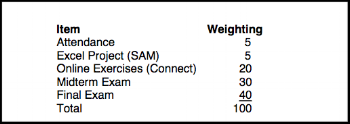It is currently 12:30 AM and my managerial accounting final, worth 40% of my grade, is in exactly 15 hours. Why then, am I writing instead of studying for a final that can make the difference between passing or failing a class?
Screenshot from my Accounting syllabus.
Simple, it has to do with opportunity cost.
In my book articles, you may have noticed that many of the authors such as Peter Drucker and Andy Grove, talk about the importance of time management. That's because time is our most important asset. It is a resource that flows constantly and relentlessly in a decreasing amount.
It is spent every single second and we have to decide what to do with it. This is often called opportunity cost. Opportunity, because we have the choice to take many different paths. And cost, because once time is spent, it cannot be returned.
Every choice we make, however we decide to spend our time, is opportunity cost. Even if we decide not to make a choice, that in itself is a choice.
Now let's go back to the accounting final. Researchers from UCLA found that if a student "sacrifices sleep time in order to study more than usual, he or she is likely to have more academic problems, not less, on the following day."
Through my personal experiences, I've also concluded that pulling all-nighters to cram for an exam, does little to increase my academic performance.
So even if I chose to study instead of writing this article, it would be a poor use of time.
This brings us to our next subject. The law of diminishing returns.
Defined by the Encyclopedia Britannica as an "economic law stating that if one input in the production of a commodity is increased while all other inputs are held fixed, a point will eventually be reached at which additions of the input yield progressively smaller, or diminishing, increases in output."
In other words, there comes a point where your input brings in fewer returns than before. For example, if you were to eat a cup of ice cream you would most likely describe it as delicious. But if you were to eat three cups, it would taste nowhere near as good as the first and you'd most likely feel guilty for eating so much ice cream in one day.
There comes a point in the law of diminishing returns where the input/output ratio shifts and the opportunity cost gets more "expensive" because you're getting less and less output.
In my scenario, I spent several hours studying every day for a week before my accounting exam. Because I spaced out my studying sessions, I was able to prepare for my exam. Cramming last minute would have required an input of my time but the output would be little to no new information learned. Thus, the opportunity cost of cramming is unfavorable, and my time is better spent doing something else, such as writing.
However, there are certain expectations to the rule. Look at professional athletes such as Kobe Bryant. Kobe, was one of the greatest basketball players to ever play the game. He knew how to shoot, dribble, pass and play defense. He was an all-around great player.
Even during his prime (2000-2002), when he was considered to be the best player in the league, he spent countless hours in the gym perfecting his game.
But then why would anyone, especially someone who is the best at what they do, spend their time getting better when they are already the best and probably only get 1% better for every 1000+ hours they put in?
Although the law of diminishing returns applies to Kobe, and as a master of his craft he had to spent hundreds if not thousands of hours in the gym to improve his game even the slightest, it was still worth it for him.
For him, basketball meant everything to him. It was his passion, his livelihood, his life. His goal was to be the best player to ever play the game, so he spent all his time focused on one area. He's known for saying, "Friends come and go, but banners last forever." Every hour he spent in the gym playing basketball could have been spent having out with friends or playing video games. But instead, he sacrificed this leisure time to continue improving on his game, that was his opportunity cost.
Although he lost countless hours of free time that could have been spent watching movies, playing video games or hanging out at a bar, he retired as a 5x NBA champion.
I'd like to conclude this article with a final thought.
Think back to how you spent your time yesterday and write it down. Then, write down how much you value or enjoyed those activities. If you're spending your time on things that don't matter to you, make a change. Keep the idea of opportunity cost and the law of diminishing returns in the back of your head when making decisions throughout your day. Hopefully this helps you figure out how to best spend your time.
Thank you for reading my article. If you'd like to learn more about time management, check out the book below!
If you enjoyed this article, consider supporting our site or signing up for our monthly newsletter. Thank you!
Reader freebies:





















